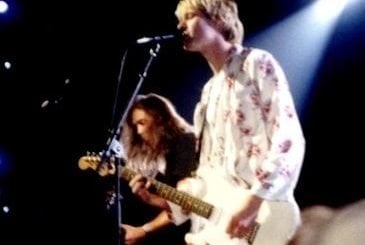Milk it by Nirvana Lyrics Meaning – Delving into the Depths of Self-Reliance and Despair
Lyrics
I don’t need a host to live
We feed off of each other
We can share our endorphns
Doll steak
Test meat
Look on the bright side, suicide
Lost eyesight, I’m on your side
Angel left wing, right wing, broken wing
Lack of iron and or sleeping
I won my own pet virus
I get to pet and name her
Her milk is my shit
My shit is her milk
Test meat
Doll steak
Look on the bright side, suicide
Lost eyesight, I’m on your side
Angel left wing, right wing, broken wing
Lack of iron and or sleeping
Doll steak
Test meat
Look on the bright side, suicide
Lost eyesight, I’m on your side
Angel left wing, right wing, broken wing
Lack of iron and or sleeping
Protector of the kennel
Ecto-plasma, ecto-skeletal
Obituary birthday
Your scent is still here in my place of recovery
Nirvana, the flag-bearer of the grunge movement, is known for their murky blend of punk-inspired angst and sludgy rock melodies that have enraptured a generation. ‘Milk It,’ a track from Nirvana’s final studio album ‘In Utero,’ stands as one of the band’s most enigmatic offerings—forcing fans and critics alike into a deep dive to extract its obscured essence.
Unraveling the layers behind ‘Milk It’ is akin to wandering through a sonic labyrinth where every turn could either lead you to a dead-end or offer a glimpse into Kurt Cobain’s tumultuous inner world. Intertwining dark humor with unsettling imagery, the song is an intense expression of self-reliance, personal anguish, and the hunger for authenticity.
Parasitic Autonomy Unleashed in a Bleak Anthem
From its opening line, ‘I am my own parasite,’ ‘Milk It’ immerses the listener into a narrative laced with themes of autonomy and self-sustenance. The notion of feeding off oneself punctuates the entire song, hinting at a cycle of self-consumption that borders on the barbaric. What does it mean to be one’s parasite, to exist without the parasitism of external influences or society’s norms?
Cobain tantalizes with rhetoric while grappling with notions of isolation and intrinsic motivation. The song presents a raw take on independence, paradoxically suggesting that one can internally harvest what’s needed to survive emotionally, a stark departure from the idea of community and mutual aid that tends to infiltrate collective thinking.
The Grim Juxtaposition of Survival and Death
‘Look on the bright side, suicide’ emerges as a menacingly ironic refrain that casts a pale light over ‘Milk It.’ This memorable line etches itself into the listener’s consciousness, stirring an uncomfortable mélange of humor and horror. The contrast of optimism and self-destruction unfolds in a harmony of lyrical cynicism, suggesting the thin dividing line between wanting to exist and the seductive escape promised by oblivion.
Cobain’s imagery simulates a twisted cheerfulness that can be interpreted as either a macabre endorsement of self-demise or a callous rebuff of romanticizing mental struggles. These lines are not merely words set to melody; they are aural chisels scarring the facade of societal taboo.
The Dichotomy of Angel Wings: A Symbol of Cobain’s Dichotomous Nature
The recurring motif of an angel with one left wing, one right wing, and a broken wing evokes a fractured duality, symbolizing Cobain’s personal struggles and multifaceted persona. These contorted images of a disfigured messenger resign the listener to question the hidden implications as the winged harbinger becomes disabled, unable to soar and incapable of delivering solace.
This fractured angel is a mirror revealing the dichotomy of human condition: the juxtaposition of lofty aspirations with the incapacitation wrought by personal demons. Cobain channels his own fragilities through this emblematic creature, flawed yet glorified, and crafts a subtle critique on the illusion of binary moral standards.
Disease as Companion: The Frightening Intimacy of a ‘Pet Virus’
‘I won my own pet virus, I get to pet and name her,’ leads us down a path where sickness becomes a companion, domesticated and cherished. It’s an unsettling revelry in welcoming decay and disorder into the fold of day-to-day existence. This is life with the unwelcome guest, personifying illness to better understand and perhaps even to mock the inevitability of human frailty.
The normalization of disease in these lines not only breaks the chains of taboo but also reflects on the intertwining of pain and identity. Cobain’s lyrics act as a lance puncturing the abscess of stigmatization surrounding sickness, spotlighting the complex relationship between an individual and their afflictions.
Olfactory Echoes and the Lingering Sense of Loss
The closing line, ‘Your scent is still here in my place of recovery,’ conveys a raw sensitivity often veiled by the tumultuous verses preceding it. Here exists a whisper of vulnerability—a confession that amid the intense declarations of autonomy and the grotesque metaphors, there’s an admission of absence and longing.
This tender vulnerability suggests that even within the fortress of self-reliance that ‘Milk It’ constructs so vividly, remnants of past influences linger like phantom scents, haunting and indelible. It’s a poignant acknowledgment that no matter how fiercely one claims independence, echoes of relationships and bygone times persist within the walls of one’s psyche.








